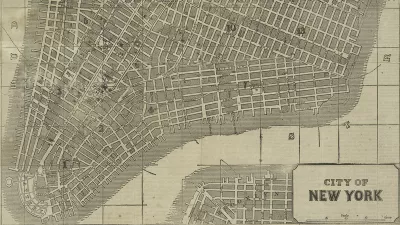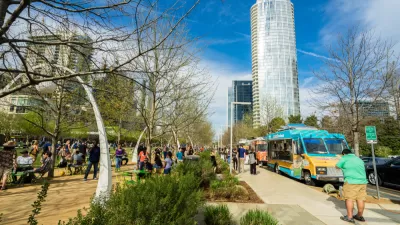The city's proposed comprehensive planning bill could create a more equitable and collaborative planning process

The New York city council's proposed comprehensive long-term planning bill, write Danny Pearlstein and David Tipson in the Gotham Gazette, "has the potential to foster a more equitable and rational planning process to guide land-use changes in New York City." However, the authors caution that "comprehensive planning is about much more than land use" and involved decisions that affect "education, transportation, public health and safety, sustainability," and all aspects of city life. Comprehensive planning could end the "piecemeal" decision-making that has crippled the city's development policies.
The authors argue that the lack of meaningful, comprehensive design guidelines lead to a host of urban problems such as overcrowded schools, excessive traffic and damage to local roads, and dead streetscapes. A "formal process that provide[s] meaningful opportunities for the community to engage in planning" can address these issues and bring forward important community concerns early on. Comprehensive planning promises a pathway to adherence to "clear and immovable guiding principles such as racial justice, reduction of segregation in schools and neighborhoods, net creation of affordable housing, and prioritization of public transit and pedestrian safety and accessibility" through multi-agency coordination and collaboration.
"New York City’s exceptional size, complexity, and competing needs only increase the necessity of a formal and predictable planning process." The proposed amendments to the comprehensive plan would "enshrine better public transit," "give local communities a real opportunity to plan proactively without being allowed to override the public good of the city as a whole," and "ensure that the plan will actually guide official decision-making."
FULL STORY: Comprehensive Planning is Not Just About Housing and Zoning

Planetizen Federal Action Tracker
A weekly monitor of how Trump’s orders and actions are impacting planners and planning in America.

Map: Where Senate Republicans Want to Sell Your Public Lands
For public land advocates, the Senate Republicans’ proposal to sell millions of acres of public land in the West is “the biggest fight of their careers.”

Restaurant Patios Were a Pandemic Win — Why Were They so Hard to Keep?
Social distancing requirements and changes in travel patterns prompted cities to pilot new uses for street and sidewalk space. Then it got complicated.

California Homeless Arrests, Citations Spike After Ruling
An investigation reveals that anti-homeless actions increased up to 500% after Grants Pass v. Johnson — even in cities claiming no policy change.

Albuquerque Route 66 Motels Become Affordable Housing
A $4 million city fund is incentivizing developers to breathe new life into derelict midcentury motels.

DC Area County Eliminates Bus Fares
Montgomery County joins a growing trend of making transit free.
Urban Design for Planners 1: Software Tools
This six-course series explores essential urban design concepts using open source software and equips planners with the tools they need to participate fully in the urban design process.
Planning for Universal Design
Learn the tools for implementing Universal Design in planning regulations.
Heyer Gruel & Associates PA
JM Goldson LLC
Custer County Colorado
City of Camden Redevelopment Agency
City of Astoria
Transportation Research & Education Center (TREC) at Portland State University
Camden Redevelopment Agency
City of Claremont
Municipality of Princeton (NJ)





























